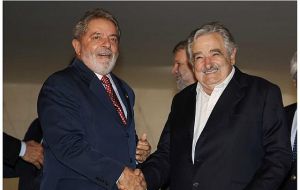MercoPress. South Atlantic News Agency
Mercosur is Uruguay’s main market for value-added exports, says Mujica
 Mujica, “let’s not dream with what we don’t have” Pte.Lula and Pte. Mujica
Mujica, “let’s not dream with what we don’t have” Pte.Lula and Pte. Mujica Uruguayan president Jose “Pepe” Mujica admitted Mercosur has its problems but it is also the market for Uruguayan exports with most added value: “to the rest of the world we sell mostly commodities, to Mercosur Uruguayan input”.
In an interview with the influential Folha de Sao Paulo and in coincidence with his one day visit on Monday to Brazil where he met with President Lula da Silva, Mujica showed a more conciliatory attitude towards Mercosur and its workings which were severely criticized by the previous administration of President Tabare Vazquez and local industry.
“I don’t agree. Mercosur surely has its problems. We must keep and better what we have and not dream of abundance when we don’t have it”, said Mujica.
He added “Brazil is our main foreign trade client, we have asymmetries and hurdles, certainly, but Mercosur is the main market for our goods with added value; to the rest of the world we export mainly commodities, to Mercosur Uruguayan input”.
When asked if the victory of conservative Sebastian Piñera in Chile and a possible victory next October of the centre-right opposition in Brazil could affect regional integration, Mujica said “there’s no turning back in this process”.
He added he didn’t anticipate major changes in the foreign policy of either country or the end of left wing governments in the region.
“I don’t think political cycles are so automatic. Chilean foreign policy will not change much under the new government, I anticipate, and I would dare say the same whatever the colour of the next Brazilian administration”, affirmed Mujica.
The Uruguayan president also said he is prepared to lift his predecessor’s veto on the nomination of former president Nestor Kirchner as standing chairman of the Union of South American Nations, Unasur.
“Uruguay is not going to put obstacles on nobody. The only obstacles will be with coup mongers. If they are not coup sponsors let Unasur decide what it feels is best for the organization”, said Mujica.
Vázquez’ veto occurred as a consequence of the dispute between Uruguay and Argentina regarding the Botnia pulp mill built on a shared waters river during the last government and which currently is awaiting a ruling from the International Court of The Hague this coming month.
Vazquez supported his veto decision saying that the Argentine government was behind the pickets blocking (for over three years) international bridges linking the neighbouring countries and which still remain impeding all people and cargo movements.




Top Comments
Disclaimer & comment rulesCommenting for this story is now closed.
If you have a Facebook account, become a fan and comment on our Facebook Page!